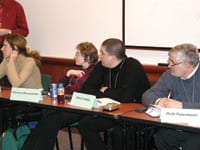A Global View Ukranian Health Care Professionals Glean Information from Massachusetts Facilities
Baystate Medical Center’s Russian and Ukranian interpreter had his work cut out for him recently when 10 Ukrainian health care professionals posed questions regarding American pharmacology – simultaneously.
The physicians visited Baystate as part of the Community Connections program, a federally funded initiative to share information between the United States and Eastern European countries, many still developing. In the past, entrepreneurs, government officials, legal professionals, and non-government organization leaders have benefited from the program, in addition to health care professionals.
And this year, the visiting professionals from Ukraine brought with them questions regarding one of the country’s most pressing health issues – the treatment of a growing number of people living with HIV and AIDS.
Administered by Fitchburg State College, Community Connections is funded by a grant from the U.S. Bureau of Educational and Cultural Affairs, and offers practical training opportunities in the U.S. for professionals and business leaders from Russia, Ukraine, Belarus, Georgia, Moldova, Kazakhstan, and Armenia.
The physicians and HIV/AIDS specialists from Ukraine that visited Massachusetts were the second group of public health professionals Community Connections has hosted during its eight-year run. Fitchburg State’s grant development coordinator, Karen Frank Mays, said the group was requested specifically because of the success of the first round of Eastern European physicians, psychologists, and other health care professionals that visited Massachusetts to study ongoing developments in the American health care system, from new pharmaceuticals to system management.
Both groups came to the states with the specific goal of gleaning new information in the fields of HIV and AIDS and drug abuse – intravenous drug use is the leading cause of HIV infection in the Ukraine and many other Eastern European countries – in hopes of improving their own delivery of treatment.
Mays said she hopes the trend toward health care-based exchanges will continue.
“There are always different types of professionals taking part in the exchange, and there is always a very strong educational component,” she said. “After hosting the first group of public health professionals, we specifically asked for a second group. We have had advances in health care technology, particularly in the treatment of HIV and AIDS, that these countries have not seen, and the physicians really benefit from learning how new drugs, new technology, and the overall systems we have in place benefit patients.”
System Analysis
In the area of HIV/AIDS treatment, for instance, this year’s group of health care professionals from Ukraine visited a number of facilities in the Commonwealth, including Baystate, to study HIV and AIDS in relation to pharmacology, community, health care delivery, drug abuse, prison populations, and children, among other topics.
Much of the subject matter was new to the group, which included directors of community health clinics, narcologists, psychologists, charity foundation directors, and infectious disease doctors. In the area of pharmacology, for instance, pharmacist Mark Heelon first recited a list of common HIV drugs used to treat patients in the U.S., in order to get a feel for how many are readily available in Ukraine. Of the 10 drugs discussed, the group recognized only one.
In fact, there is no countrywide system in place at all to help streamline the treatment and support of HIV and AIDS patients in Ukraine.
“They were most impressed with the system-wide approach to HIV and AIDS, which is something they have yet to develop in their country,” said Frank. “We use community health workers and the expertise of nurses to great effect, and the group said they were amazed at how it all works together. The coordination between counselors and physicians, the attention to psychological health, the training of specialists… all of that was a very big deal to them.”
Through an interpreter, the group detailed the various differences between their country’s system and that of the U.S.
“It’s very different,” said Valeriy Shevchuk, a doctor at the Cherkasy Regional Center for Prevention and Treatment of HIV and AIDS. “We’re only just starting a lot of the things the United States has had in place for some time.”
For example, Shevchuk said, only advanced HIV patients typically receive drug therapy, whereas in the U.S. treatment is started as soon as possible.
“Patients must go to special AIDS centers to receive drugs rather than a pharmacy,” he said, “and not all patients are able to receive meds even then. There are only five such centers, in a country of 47 million people. And there are only 13 registered HIV drugs in Ukraine, so don’t be surprised if we don’t recognize them.” Shevchuk continued.
As the HIV and AIDS treatment system slowly improves in Ukraine, physicians have only scant resources to manage new patients and new treatments, organizational systems, and funding opportunities. The group began to write notes furiously, for instance, when Heelon explained that Retrovir, a drug currently available in Ukraine, becomes deactivated when combined with Zerat, a drug that will soon be approved in their country and put into use.
“Where do they go to look up these drug interactions?” Heelon asked rhetorically. “There is no great reference. They also have major issues of time management and organization to deal with, and that alone can lead to possible adverse drug interactions.”
The Ukraine group was also interested in learning more about the prevention of HIV transmission from pregnant mothers to infants – in Ukraine, the transmission rate is still 15{06cf2b9696b159f874511d23dbc893eb1ac83014175ed30550cfff22781411e5}, whereas in the U.S., that rate has been reduced significantly – as well as nutrition, social attitudes toward people living with HIV and AIDS, hospice care, and drug abuse treatment and education, as intravenous drug use is the leading cause of HIV in Ukraine.
Happy Returns
“Overall, they were impressed with our willingness to share information on all topics,” said Frank. “They said the technical information was eye-opening, and they took home plenty of new knowledge.”

